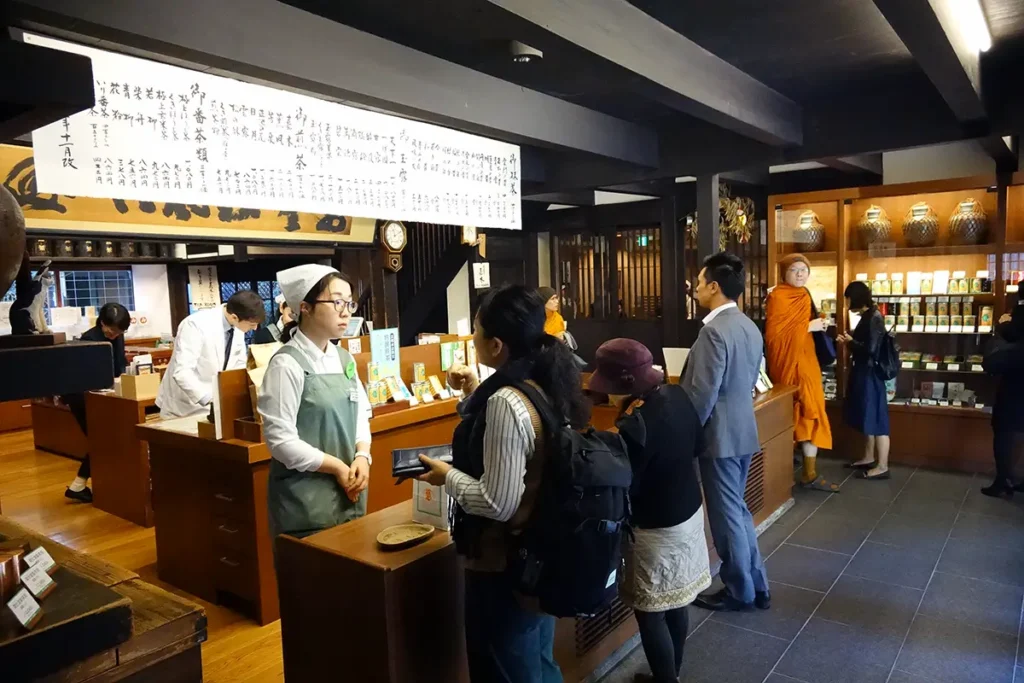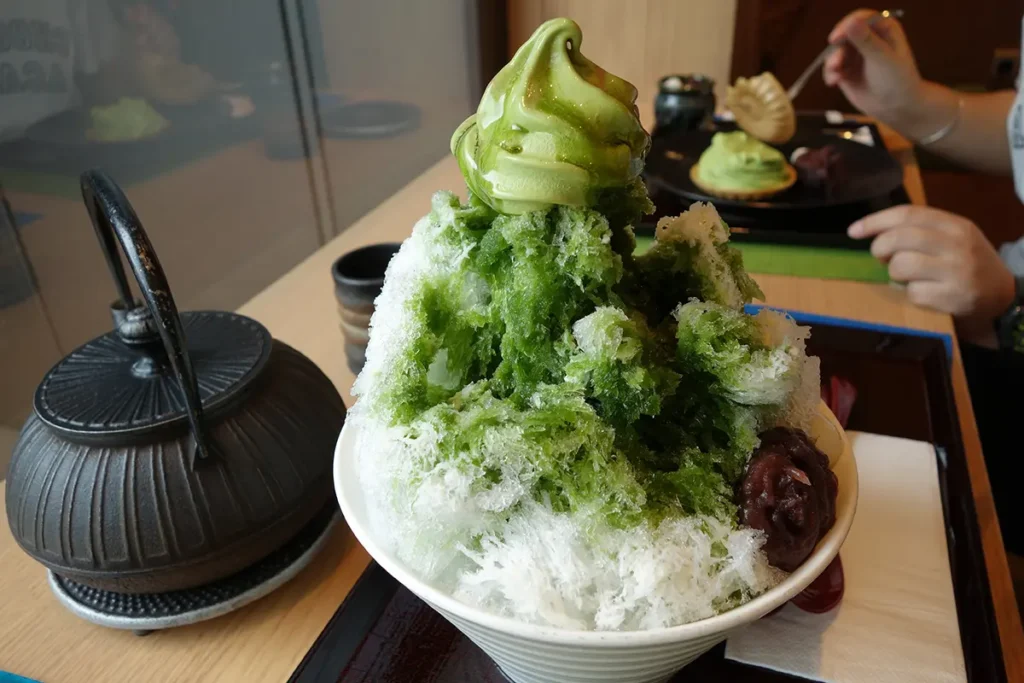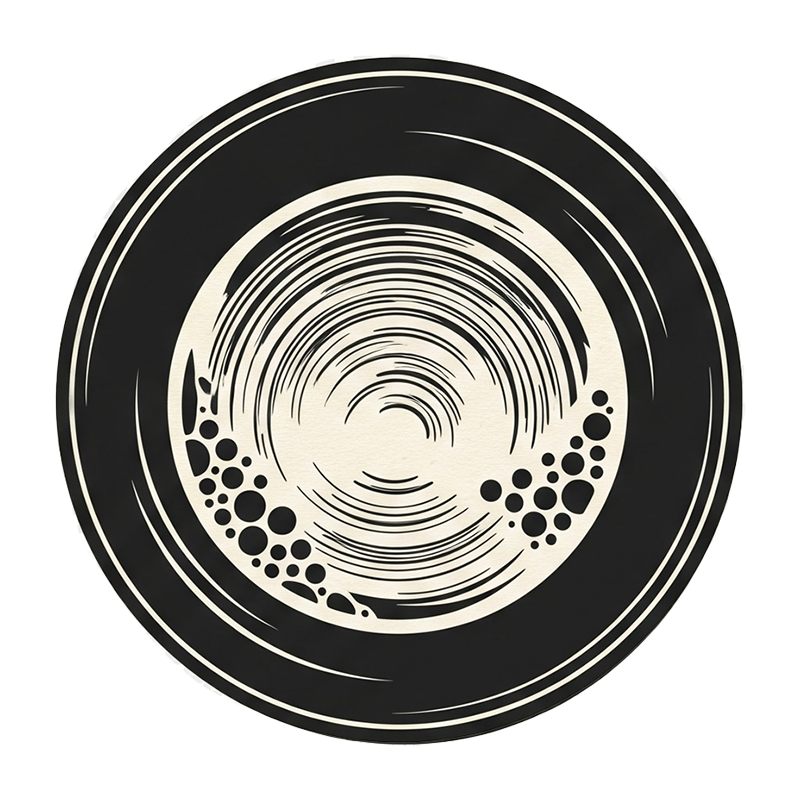In the world of matcha, all roads lead to Uji. This small city south of Kyoto is not just a place; it is the very heart of matcha’s history and culture. For centuries, its unique terroir has produced the finest tea in Japan. But the region’s legendary status is not just a gift of nature. It is the result of the unwavering dedication of a handful of historic producers who have acted as the keepers of the craft.
These are not simply companies; they are institutions, some with histories stretching back over 300 years. They are the purveyors to the grand masters of Japan’s tea ceremony schools, the guardians of traditional methods, and the benchmark for quality against which all other matcha is measured. To know their names is to know the crème de la crème of the matcha world.
Kanbayashi Shunsho (上林春松本店) – The Shogun’s Purveyor
Founded: c. 1560s
With an astonishing history spanning over 450 years, Kanbayashi Shunsho holds a unique and powerful claim to fame.
Originating in the 16th century, the Kanbayashi family was appointed as one of the Goyō-chashi, the exclusive and protected purveyors of tea to the Tokugawa Shogunate. This was not just a title; it was a position of immense trust and responsibility, supplying the ruling class of Japan.
Today, their matcha reflects this aristocratic heritage—deeply traditional, exceptionally refined, and intrinsically linked to the formal history of Chadō.
Marukyu Koyamaen (丸久小山園) – The Standard of Excellence
Founded: Late 1600s
If there is one name synonymous with the highest echelons of matcha, it is Marukyu Koyamaen.
With a history beginning in the Genroku era, this producer has spent over 300 years perfecting the art of tea cultivation and blending. Their reputation is unparalleled, built on their role as the trusted supplier to the most revered tea ceremony schools in Japan.
Marukyu Koyamaen’s mastery lies in their meticulous quality control and their profound skill in blending, which allows them to produce a vast and nuanced range of matcha. From sublime koicha grades used in the most formal ceremonies to exceptional daily usucha, their entire lineup is a testament to a legacy of perfection.
Read more here.
Ippodo (一保堂) – The Ambassador of Uji
Founded: 1717
For many enthusiasts outside of Japan, Ippodo is the first taste of truly exceptional matcha. Founded over 300 years ago, their main store in Kyoto has become a pilgrimage site for tea lovers. Ippodo has masterfully balanced its deep respect for tradition with an approachable elegance that has made it a global ambassador for Uji tea.

They are renowned for producing remarkably smooth, well-balanced, and umami-rich matcha. Each of their blends is given a poetic name, or chamei, which represents a unique and consistent flavor profile. To drink Ippodo tea is to experience the quintessential, harmonious taste of Kyoto.
Yamamasa Koyamaen (山政小山園) – The Tea Ceremony Specialist
Founded: 1861
While sharing a part of its name with its older peer, Yamamasa Koyamaen is a distinct and highly respected institution in its own right. Beginning as a tea farm, the company has dedicated itself to producing matcha that meets the exacting standards of Chadō, the Way of Tea.
Their deep connections to the world of the tea ceremony have given them a reputation as a specialist’s producer. Yamamasa Koyamaen focuses on creating high-grade matcha with the specific characteristics—flavor, color, and froth—that are most prized by tea masters for both practice and formal presentation.
Key Terms
- Chadō (茶道): “The Way of Tea,” the Japanese cultural practice and philosophy surrounding the ceremonial preparation and presentation of matcha.
- Koicha (濃茶): “Thick tea,” a dense, intensely flavored style of matcha central to the tea ceremony, made with only the highest quality leaves.
- Chamei (茶銘): A poetic name given to a specific blend of matcha by a producer, such as Unkaku (Cloud Crane) or Wako (Light of Peace).
Nakamura Tokichi (中村藤吉) – The Cultural Landmark
Founded: 1854
More than just a tea producer, Nakamura Tokichi is a cultural institution in Uji. Their historic main store, a beautifully preserved former tea factory, is a designated “Important Cultural Landscape.” This deep connection to the history and physical heritage of Uji is reflected in the quality of their tea.

While revered for their exceptional traditional matcha, Nakamura Tokichi has also famously embraced the culinary potential of their product. They are celebrated for their exquisite matcha-infused sweets and desserts, served in their iconic teahouses. They represent a perfect marriage of preserving the past while thoughtfully innovating for the future.
Conclusion: A Legacy of Taste
These producers are not just brands; they are the living history of matcha. They are families who have passed down knowledge through generations, perfecting a craft that is inseparable from the cultural and spiritual life of Japan.
While we will explore each of these masters in more detail in future posts, knowing their names is the first step. When you choose a matcha from one of these Uji legends, you are not just buying tea; you are tasting a legacy.
